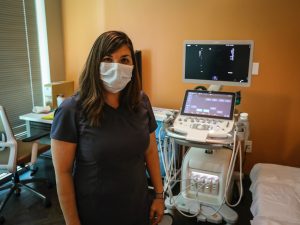Congratulations on your pregnancy! This article is for you if you are in early pregnancy and wondering “what’s next?”. As a midwife working in the UK, these are the 5 questions I ask my clients during their first appointment. To have the answers before you get there gives you a head start, helps you to feel more prepared, calm and confident, and helps the appointment run smoothly.
1. What Sort of Birth Do you Want?
Labour and birth may seem very far off in the distance at the moment but this is an important question to consider as it effects where you book. In the UK, you can choose to book (i.e. register with) with your preferred hospital so this question is very important. For example, if you really want to labour in the pool, or have a pool birth, registering with a hospital that has 1 pool won’t be right for you.
Have a look at the hospitals in your area. Often they will have virtual tours on their website that you can take which can be a good place to start. If you want a homebirth, you can also explore which hospitals near you have a homebirth team. If this isn’t clear, you can ask your GP who will know about the hospital in their catchment area.
Once you have decided on your preferred hospital, you will need to book with them. This can usually be done directly via their website, or by phoning their booking line. Commonly, your booking appointment will be between 8 and 10 weeks of pregnancy.
You can also notify your GP of your pregnancy, and they will refer you for a booking appointment at the hospital of their catchment area (although this doesn’t take into consideration any of your preferences).

2. Are you Taking a Pregnancy Multivitamin?
If not, do start taking one! It is important that you provide your baby with the rights nutrients to help them grow. In the UK the 2 that are particularly important for early pregnancy are folic acid and vitamin D. Folic acid helps to prevent a condition called spina bifida (a neural tube defect), and vitamin D helps bones to develop. You can learn more about this, including managing symptoms like morning sickness in early pregnancy, in our Pregnancy Nutrition course.

3. Is there any Relevant Family History?
This is a question that you will get asked in your booking appointment that is important for predicting certain conditions in pregnancy and setting you on the right care pathway. In early pregnancy, before you get to your first appointment, it can be useful to find out so that you are prepared when the question comes up.
The midwife will want to know of any first degree (that is your siblings, parents, or grandparents) family history including: diabetes, sickle cell and thalassemia, hypertension (high blood pressure), mental health illness, congenital disorders, learning difficulties, genetically inherited conditions (including dislocating hips), and twins. They will also ask if you and your partner are related.

4. Do you Want to Have Screening?
During the first appointment, the midwife will ask you if you want screening for Down’s, Edward’s and Patau’s Syndrome. The first test that is offered is usually completed with the first ultrasound scan between 11 weeks and 14 weeks of pregnancy. The sonographer will measure the back of baby’s neck on the ultrasound to determine nuchal translucency, ask a serious of screening questions, and do a maternal blood test.
This initial test gives you a risk factor. If that risk is 1:150 or less then no further screening is offered. If your risk factor comes back as 1:150 or greater (e.g. 1:100 or 1:50) then you will be offered further screening. This further screening usually includes taking a sample of the amniotic fluid for testing. You can accept the first screening and then, if the results indicate a high risk factor, decline the second screening, you can also decline the first screening – the choice is yours. There is more detailed information on this screening on the NHS website.

5. How are You Going to Protect Your Health?
A common theme that starts in early pregnancy, and continues on, is information, unsolicited advice, and internet rabbit holes. What this means is that, often well meaning, friends and family will share their tips and stories regardless of whether you asked for them or not. This, combined with the hours of internet searching, ending in a panic about a rare disease you start to believe either you or baby may have (we have all been there right?!). Time and time again, I have witnessed how this bombardment can take a very serious toll on your emotional, mental, and physical health.
So, as a midwife, my final top tip for early pregnancy is protect your health. Set firm boundaries with friends and families (this can be done gently too), let them know that you will ask for tips or stories if you want them. Next, choose your sources. Here at The Parent Education Company we pride ourselves on providing professional, reliable, trustworthy information from the latest evidence based research.
We are on your side and work hard to help you feel calm, capable, and confident as you head through pregnancy, labour and birth, and on into parenthood. We are expanding all the time, so if there is a topic you feel isn’t yet covered on our platform, let us know here and we will look into adding a host to cover that area.





